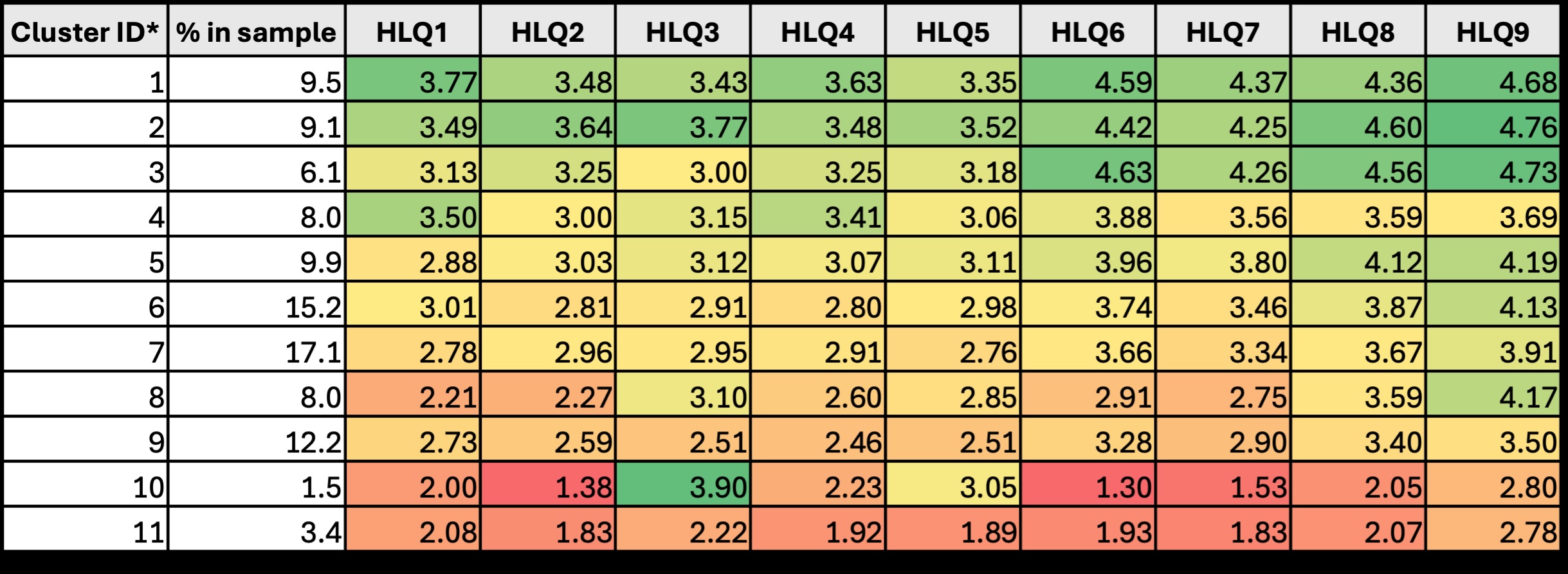Session Information
Date: Monday, October 27, 2025
Title: (1248–1271) Patient Outcomes, Preferences, & Attitudes Poster II
Session Type: Poster Session B
Session Time: 10:30AM-12:30PM
Background/Purpose: Health literacy is a potential social determinant of health, fundamental to patient engagement, clinical communication, and long-term outcomes of disease. Understanding health literacy at the individual and population levels are essential to drive equitable, person-centered healthcare.We aimed to identify and describe health literacy profiles in people with rheumatic and musculoskeletal diseases (RMDs) attending a tertiary rheumatology service.
Methods: Patients attending the rheumatology clinic at King’s College Hospital, UK, were invited to complete a survey including the nine-domain Health Literacy Questionnaire (HLQ), socio-demographic and clinical characteristics. Hierarchical cluster analysis, following the Ophelia (Optimising Health Literacy and Access) process (1) was conducted to identify patient subgroups based on the nine HLQ domains and other characteristics.
Results: In total, 263 people with RMDs were included in this study. Eleven distinct clinically relevant clusters were identified (Table 1). Clusters 1 (10%) and 2 (9%) exhibited high scores across all HLQ domains, with strong engagement, navigation, and comprehension capabilities. These clusters comprised mainly professionally employed women, with Cluster 1 younger patients (mean 32.8 years) with connective tissue diseases (CTD) and cluster 2 including older patients (mean 55.5 years) with inflammatory arthritis (IA).Cluster 3 (6%) showed high engagement with limited emotional support. Most were men working in technical or professional roles. Clusters 5 (10%), 6 (15%), 8 (8%), and 9 (12%) showed mixed profiles. For instance, Cluster 5, predominantly women, demonstrated strong information-processing skills but only moderate social support. Cluster 8 had adequate comprehension despite poor support.Cluster 6 (15%) represented a younger, ethnically diverse group with moderate comprehension, limited support, and high unemployment. Cluster 7 (17%) consisted mainly of older, predominantly white, retired individuals with average literacy levels and low provider engagement. Clusters 10 (2%) and 11 (3%) reflected the most complex challenges. Cluster 10 revealed a distinct profile of strong self-management despite extremely low support and engagement; members were mostly female, technically trained, and unemployed. Cluster 11, with the lowest scores across all domains, included older, professionally inactive women.
Conclusion: Health literacy among patients at King’s College Hospital Rheumatology Clinic is highly variable, with some groups facing substantial barriers to engagement and support. Notable patterns emerged, such as higher health literacy amongst older patients with IA and younger patients with CTD, while lower health literacy in certain domains was associated with unemployment and non-Caucasian ethnicity. Identifying health literacy profiles can support more targeted and equitable approaches to patient communication, care planning, and service design.Reference1. Osborne R et al. The Ophelia Manual. The Optimising Health Literacy and Access process to plan and implement National Health Literacy Demonstration Projects.
 Table 1: Cluster analysis of Health Literacy Questionnaire (HLQ) data from 263 patients attending the rheumatology clinic at King’s College Hospital. HLQ1 (Feeling understood and supported by health care providers), HLQ2 (Having sufficient information to manage my health), HLQ3 (Actively managing my health), HLQ4 (Social support for health), HLQ5 (Appraisal of health information), HLQ6 (Ability to actively engage with healthcare providers), HLQ7 (Navigating the healthcare system), HLQ8 (Ability to find good health information), HLQ9 (Understand health information well enough to know what to do).
Table 1: Cluster analysis of Health Literacy Questionnaire (HLQ) data from 263 patients attending the rheumatology clinic at King’s College Hospital. HLQ1 (Feeling understood and supported by health care providers), HLQ2 (Having sufficient information to manage my health), HLQ3 (Actively managing my health), HLQ4 (Social support for health), HLQ5 (Appraisal of health information), HLQ6 (Ability to actively engage with healthcare providers), HLQ7 (Navigating the healthcare system), HLQ8 (Ability to find good health information), HLQ9 (Understand health information well enough to know what to do).
.jpg) Figure 1: Infographic summarising characteristics of individuals within each of the described clústers, including health literacy strengths and needs.
Figure 1: Infographic summarising characteristics of individuals within each of the described clústers, including health literacy strengths and needs.
To cite this abstract in AMA style:
Calomarde-Gomez C, Dey M, Wincup C, Alonso de Francisco M, Cheng C, Osborne R, Nikiphorou E. Health Literacy diversity among rheumatology patients: insights from a tertiary rheumatology centre [abstract]. Arthritis Rheumatol. 2025; 77 (suppl 9). https://acrabstracts.org/abstract/health-literacy-diversity-among-rheumatology-patients-insights-from-a-tertiary-rheumatology-centre/. Accessed .« Back to ACR Convergence 2025
ACR Meeting Abstracts - https://acrabstracts.org/abstract/health-literacy-diversity-among-rheumatology-patients-insights-from-a-tertiary-rheumatology-centre/
